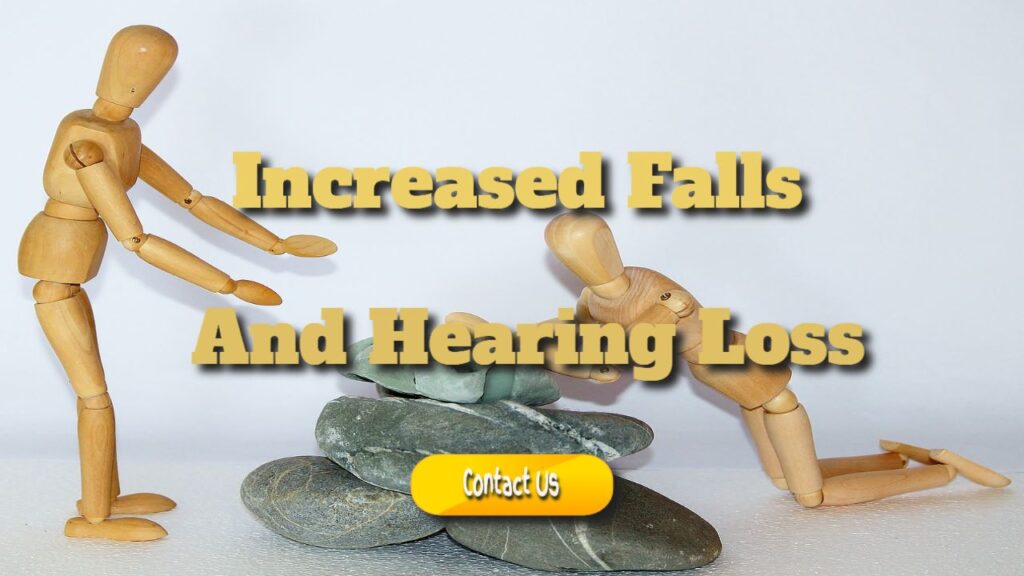Increased Falls And Hearing Loss
Increased Falls And Hearing Loss: Your hearing is far more critical than you may realise. Our ears include more than just the auditory nerve.
The cochlea, responsible for our sense of balance, is also housed in the ears.
The arcuate ducts and pinnae are located within the cochlea and are crucial for our sense of balance.
This, together with the senses of sight and touch, is how our bodies experience movement.
I bet you didn’t know that people with trouble hearing have a higher rate of accidental falls.
The Relationship
Hearing loss and balance issues are frequently associated due to the proximity of the auditory nerve and cochlea.
Inner ear abnormalities that cause hearing loss may also cause balance issues or increased falls.
Hearing loss and balance issues may not always occur together. You can have hearing loss without ever having balance issues.
Even if you do not have hearing loss, you may experience dizziness or balance issues.
It is essential to be proactive if you feel unstable or have difficulties hearing.
Who Should I Get Assistance From?
A licenced audiologist can assist you in managing your hearing loss and determining balance difficulties.
You should seek medical attention immediately if you recently had sudden hearing loss due to a head or ear accident.
Hearing Loss Types
The sensorineural form of hearing loss affects the great majority of individuals who are afflicted with persistent hearing loss.
Sudden sensorineural hearing loss (SSHL), often called sudden deafness, is a sudden loss of hearing.
It can happen all at once or over three days in a person. It is a medical emergency, and patients with SSHL should seek immediate medical assistance.
Some SSHL patients recover fully without treatment, often within the first few days, if treated promptly. Others may improve gradually over 1-2 weeks.
Many different things can lead to sensorineural hearing loss.
Ageing
Genetics
Diseases
Toxic pharmaceuticals
Trauma to the head
Inner ear malformation
Loud noise exposure
Symptoms
Sensorineural hearing loss impairs the ability to hear sounds. Even when speech is loud enough to be heard, it may sound slurred or muffled in some circumstances.
Options for treatment
Sensorineural hearing loss can be treated with devices such as hearing aids and cochlear implants.
Hearing aids can boost volume and enhance sound quality, making it easier to understand the conversation. Hearing devices can treat 95% of cases of sensorineural hearing loss.
Cochlear implants, and increasingly hybrid cochlear implants, stimulate the auditory nerve in the inner ear directly electrically.
Cochlear implants are suitable for children and adults with moderate to profound hearing loss who cannot benefit from hearing aids.
Prevention
It can affect anyone, although it most commonly affects people between 30 and 60.
Sensorineural hearing loss should be corrected as soon as feasible with hearing aids. This helps to slow the disease’s course. Another simple strategy to minimise future damage is restricting or eliminating noise exposure.
Wear hearing protection if you plan to work in a noisy setting or attend a concert or other high-volume event.
Hearing Loss Caused by Conductivity
Multiple factors, such as:
Earwax buildup or earwax compression
Disease-related fluid in the middle ear
Infections of the ears
Allergies
Eardrum perforation
Eardrum or middle ear bone trauma
Middle ear bone stiffness that is congenital or inherited
Other middle ear abnormalities
Symptoms
Conductive hearing loss usually results in a reduction in sound level, making faint noises unheard.
This does not make sounds challenging to interpret and does not affect speech comprehension.
If conductive hearing loss is caused by an ear canal blockage, eliminating it will generally restore all or part of the hearing.
Otherwise, this hearing loss is frequently treatable with medical and surgical intervention.
If medical intervention is not an option. Hearing aids are effective in treating conductive hearing loss.
Keep your ears clean and dry, but avoid using cotton swabs.
Put your sense of hearing to the test.
Hearing loss can often progress so slowly that it is impossible to detect at first. However, there are specific common symptoms of hearing loss.
Brought To You By – Microsuction Edgware
The post Increased Falls And Hearing Loss appeared first on https://gqcentral.co.uk



